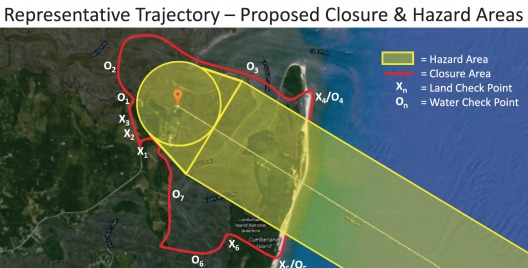Camden County, home of Cumberland Island National Seashore, has spent millions of dollars since 2016 in an effort to build a spaceport where private spaceflight companies could launch rockets.
That has raised a lot of concern with locals and environmentalists concerned that launching rockets over one of the East Coast’s last remaining pristine coastal wilderness areas, sensitive marshlands, and dozens of private properties could be problematic, or dangerous.
County officials have been dismissing questions of environmental concern for two years, saying everyone should wait for the release of a Draft Environmental Impact Statement by the Federal Aviation Authority, the governing body responsible for issuing the necessary launch operator licenses for spaceports.
The DEIS, paid for by Camden County and written by private firm Leidos, with guidance from the FAA, was released this month. The results did not appease environmentalists and concerned citizens.
“The Environmental Impact Statement doesn’t answer the questions that have been raised. It’s an incomplete document. To me, you cannot assess the costs and the benefits of this project without truly understanding the risks associated with that type of land use in that location,” said Megan Derosiers, director of Brunswick-based environmental group One Hundred Miles.
“Based on the document that we have, there’s nothing that can convince me that this is a good idea in this spot.”
One of the biggest issues with the study, according to several property owners who have been studying the subject, is the designation of campers and hikers on Cumberland Island and property owners on both Cumberland Island and Little Cumberland Island as “authorized personnel.”
Now, based on a letter sent to inquiring parties this week, it appears the FAA may agree that that is an inappropriate designation.
The north end of Cumberland Island, including the federally designated wilderness area, and the entirety of Little Cumberland Island are located within the DEIS’s “hazard zones” based on their location within six miles of either the most northerly or southerly trajectories considered allowable by the DEIS. By law, any person within these hazard zones must be evacuated for a launch in order to achieve the FAA-mandated casualty expectation of one in one-million per launch.
This DEIS allows anyone deemed “authorized personnel” to remain within the hazard zones during a launch, thus eliminating the need for evacuation, which may have been problematic because of a Georgia state law prohibiting forced evacuation of private property owners from their homes for the benefit of private industry. There are more than 100 private property owners on Little Cumberland Island.
The term “authorized personnel”, as applied by the DEIS refers not to those involved in the operation of the spaceport, but to uninvolved members of the public that could be directly under the flight path of a rocket during launch.
Jim Renner, a Little Cumberland Island property owner and a geologist who has worked in environmental permitting for a wide range of municipal and industrial projects, wrote to the FAA requesting an explanation of why he and his family would be considered “authorized” during a launch.
FAA Environmental Specialist Stacey Zee responded via email, saying authorized personnel was not an FAA term.
“The term ‘authorized persons’, as used in the DEIS, is a term that Camden has used to describe individuals who could remain in certain areas on Cumberland Island and Little Cumberland Island during operations at the proposed launch site. It is not a term used anywhere in FAA regulations. In accordance with 14 CFR 417.107, a launch operator may initiate flight only if the risk to any individual member of the public does not exceed a casualty expectation of one in one million per launch for each hazard. Therefore, a launch operator could not conduct a licensed launch from Camden if the risk to any member of the public, including those who remain on Cumberland Island and Little Cumberland Island, did not meet this requirement. A launch operator who intends to conduct launches from Camden may need to identify closure areas to meet this requirement.”
Renner plans to meet with FAA officials soon to further discuss the authorized personnel issue.
Zee also confirmed that the FAA would extend the public comment period on the DEIS to 90 days, although Renner and others had requested a 180-day comment period to further dissect the EIS. The DEIS public comment period will currently run through June 14, Zee wrote.
Spaceport Camden Project Lead and Camden County manager Steve Howard would not return calls for this story after multiple attempts to reach him via email and phone.
Overall, the DEIS proposes the project move forward as proposed, claiming that any adverse effects are “short term and temporary”, and therefore not significant enough to halt the project.
Many environmentalists and locals disagree.
Look for a Blue Ridge Outdoors coming next month for a full story on the origins and potential impacts of Spaceport Camden.








